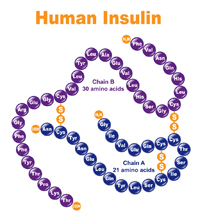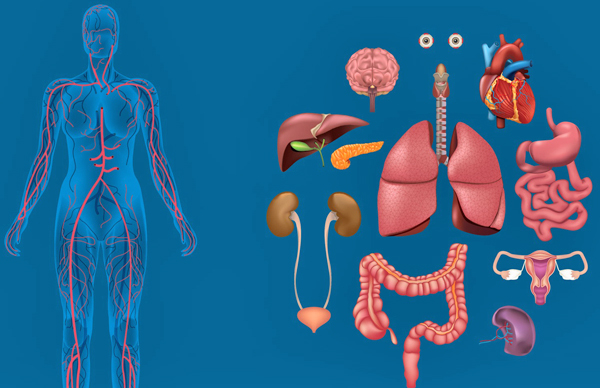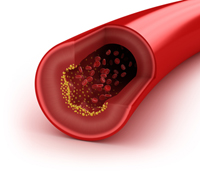Your T4 Levels Can Make a World of Difference in Your Health
 An Endocrine Disorder is one condition that’s capable of spreading quickly throughout your body, rather than simply staying in a central location. Because hormones literally travel from the top of our head to the tips of our toes through the bloodstream, conditions like Polycystic Ovarian Syndrome (PCOS) can adversly affect your entire body. As an endocrine disorder, Polycystic Ovarian Syndrome (PCOS) creates an imbalance in sex hormones in women, meaning that your estrogen and progesterone levels are low compared to your androgen (male hormone) levels. When these androgen levels become higher than normal, particularly the testosterone level, they can produce imbalances in other hormones in your body, like thyroxine (T4). This being said, it’s easy to see how Polycystic Ovarian Syndrome (PCOS) can quickly affect your thyroid and other various hormones. However, PCOS can be managed thanks to natural means like a healthy diet, regular exercise, and targeted nutritional supplements that contain minerals, vitamins and botanicals.
An Endocrine Disorder is one condition that’s capable of spreading quickly throughout your body, rather than simply staying in a central location. Because hormones literally travel from the top of our head to the tips of our toes through the bloodstream, conditions like Polycystic Ovarian Syndrome (PCOS) can adversly affect your entire body. As an endocrine disorder, Polycystic Ovarian Syndrome (PCOS) creates an imbalance in sex hormones in women, meaning that your estrogen and progesterone levels are low compared to your androgen (male hormone) levels. When these androgen levels become higher than normal, particularly the testosterone level, they can produce imbalances in other hormones in your body, like thyroxine (T4). This being said, it’s easy to see how Polycystic Ovarian Syndrome (PCOS) can quickly affect your thyroid and other various hormones. However, PCOS can be managed thanks to natural means like a healthy diet, regular exercise, and targeted nutritional supplements that contain minerals, vitamins and botanicals.
+ Click here to learn about the all natural PCOS 5-Element Solution
+ Click here to read more articles about PCOS and Hormones
Causes
The Importance of T4
 Polycystic Ovarian Syndrome (PCOS) is often caused by Insulin Resistance (IR), another hormonal issue that results from the cells of your body becoming unable to utilize insulin. Insulin is the hormone that accesses the mitochondria, the powerhouses of your body’s cells, and turns glucose (blood sugar) into energy. Without the ability to do this, excess blood sugar runs rampant throughout your body, which can cause damage to arterial walls and put you at greater risk of developing heart disease, diabetes, pre-diabetes, obesity, Metabolic Syndrome (Syndrome X), and, of course, Polycystic Ovarian Syndrome (PCOS).
Polycystic Ovarian Syndrome (PCOS) is often caused by Insulin Resistance (IR), another hormonal issue that results from the cells of your body becoming unable to utilize insulin. Insulin is the hormone that accesses the mitochondria, the powerhouses of your body’s cells, and turns glucose (blood sugar) into energy. Without the ability to do this, excess blood sugar runs rampant throughout your body, which can cause damage to arterial walls and put you at greater risk of developing heart disease, diabetes, pre-diabetes, obesity, Metabolic Syndrome (Syndrome X), and, of course, Polycystic Ovarian Syndrome (PCOS).
When insulin levels and sex hormone levels are out of balance, it is easy to see how the hormones of the thyroid, which control many functions of your body, can also be affected.
The Hormones of the Thyroid
The thyroid is a small gland in your neck. Often compared in shape to a butterfly or a bowtie, this gland manufactures and releases two important hormones: T3 (triiodothyronine) and T4 (thyroxine). These hormones are created in a process that is unique to the thyroid.
The only part of your body physically capable of absorbing and utilizing iodine, your thyroid gland collects iodine from the various foods and nutritional supplements you put into your body. After iodine has been absorbed, it’s then combined with tyrosine, an amino acid. The results of this combination are T3 and T4 (their numbers indicate the respective iodine molecules to which the tyrosine is bound).5
Although the production of T3 and T4 is important, it cannot be initiated until your pituitary gland releases Thyroid Stimulating Hormone, or TSH. Once TSH is being secreted in your brain, your thyroid can begin to manufacture T3 and T4.
When your thyroid is producing your hormones, 80 percent of them are T4. Once released, thyroxine travels through your bloodstream and, with the help of T3, aids in the effort to make energy out of oxygen and calories. Along the way, T4 is converted into T3, a process that happens in several different organs, such as your hypothalamus.
When traveling through the bloodstream, T4 does more than create energy: it participates in many functions upon which life itself relies. Some of these include:4
 Guiding the production of body heat
Guiding the production of body heat- Regulating your metabolism
- Toning your muscles
- Breaking down protein, fats, and carbohydrates
- Maintaining steady heart and respiratory rates
What Does PCOS Have to Do with T4?
There are, essentially, two different reasons why women who have, or are suspected to have, Polycystic Ovarian Syndrome (PCOS) should be concerned about their T4 levels.
- For women who already know they have Polycystic Ovarian Syndrome (PCOS), being proactive and keeping a watchful eye on T4 levels can help prevent further health complications.
- For women who are not yet diagnosed with Polycystic Ovarian Syndrome (PCOS), it’s important to keep in mind that several of this condition’s symptoms are similar to those present in thyroid disorders.
- For this reason, a solid diagnosis, one way or the other, can only be achieved after testing is done on T4 levels, as well as levels of T3 and TSH. Some similar symptoms include: sporadic periods, hair loss, weight gain, and fatigue. The most common thyroid disorders associated with Polycystic Ovarian Syndrome (PCOS) are hyperinsulinemia, hyperthyroidism, and hypothyroidis.
Symptoms
PCOS and the Imbalance of Sex Hormones
Both males and females have “male” and “female” sex hormones, meaning that both men and women possess different levels of estrogen, progesterone, and testosterone. Although these hormones are present in both men and women, they are present in different levels; women have more estrogen and progesterone and men have more testosterone. When these levels become imbalanced, your body has a difficult time maintaining a normal reproductive system. In women, elevated levels of male sex hormones can lead to Polycystic Ovarian Syndrome (PCOS), which is a very stressful, uncomfortable, and often life-changing condition.
The reason Polycystic Ovarian Syndrome (PCOS) is so distressing is because it causes physical and emotional pain. The symptoms you endure are both difficult to live with on a daily basis and almost impossible to reconcile with your identity as a woman. With excess testosterone, traditionally male physical characteristics, such as chest hair, can develop and make a woman question her very idea of who she is as a female.
Some of the embarrassing and painful symptoms Polycystic Ovarian Syndrome (PCOS) sufferers endure include:6
- Infertility, which can crush the dream of becoming a biological parent.
- Polycystic ovaries can contribute to infertility and sometimes painful pelvic issues.
- Hirsutism is the excess growth of hair in abnormal places, such as on the chest, face, and back.
- Hair loss, similar to male pattern baldness, or the thinning of hair.
- Infrequent or sporadic periods that contribute to infertility and make everyday life more stressful.
- Fatigue from a lack of energy in the body’s cells.
- A lack of ovulation, an underlying cause of infertility.
- Weight gain and obesity, a major source of physical and emotional stress in women and one that can serve to increase the severity of Polycystic Ovarian Syndrome (PCOS).
 Skin problems, such as acne, dry skin, skin tags, and acanthosis nigricans (the development of thick, dark patches of skin).
Skin problems, such as acne, dry skin, skin tags, and acanthosis nigricans (the development of thick, dark patches of skin).- High cholesterol and high blood pressure, which can put women who have Polycystic Ovarian Syndrome (PCOS) at an elevated risk for the development of heart disease.
- Sleep disturbances, including sleep apnea, snoring, and insomnia, which make women tired and prevent them from getting a good night’s rest.
Treatment Options
What Are the Treatment Options?
When thyroid issues are found, treatment will vary depending on how imbalanced the hormone levels are and whether they are high or low. Fortunately, treatment for thyroid issues is something that has been thoroughly researched and is well understood by most physicians.2
Treatment for Polycystic Ovarian Syndrome (PCOS), on the other hand, is less straightforward. Oftentimes, doctors will try to treat individual symptoms, such as irregular periods or skin conditions, without actually getting to the core of the problem. This approach can be ineffective, as a recent study has shown that Metformin, a common medication for women with IR, has the potential to affect levels of thyroid hormones.1
To get to the underlying problem and address the symptoms of Polycystic Ovarian Syndrome (PCOS), women must address the condition itself. Regrettably, modern medicine has yet to find a cure for this condition; however, a natural approach can be effective in treating the disorder.
Natural Therapies
Control Your PCOS Through Natural Means
 Again, while you can’t ‘cure PCOS’, there are steps you can take to manage the symptoms by addressing one of its primary causes, Insulin Resistance. To help control Polycystic Ovarian Syndrome (PCOS), you’re encouraged to incorporate the following five lifestyle changes:
Again, while you can’t ‘cure PCOS’, there are steps you can take to manage the symptoms by addressing one of its primary causes, Insulin Resistance. To help control Polycystic Ovarian Syndrome (PCOS), you’re encouraged to incorporate the following five lifestyle changes:
- Maintain a healthy, IR-friendly diet. The presence of IR indicates your body cannot process food normally, so avoiding foods that cause an increase in insulin is important. Stick to foods that are rich in fiber and low on the glycemic index and, of course, stay away from simple carbohydrates or foods that are high in sugar.
- Create a regular exercise routine. Working out is crucial to battling a hormonal imbalance and all of its symptoms. Don’t push this too hard, but ensure the exercise routine follows a consistent schedule and challenges your body.
- Call on emotional support. The symptoms of this condition are always distressing, so instead of going it alone you should rely on the support of others who have gone through the same challenges.
- Incorporate nutritional supplements into a healthy diet. Nutritional supplements are blends of specific vitamins, minerals, and botanicals that are capable of targeting particular health issues and helping your body respond to their effects.
- Get smart. Use resources like this website to learn all you can about your condition. It is very empowering to be able to understand what is happening to you and to be able to talk about it with your doctor.
Getting control and maintaining control over Polycystic Ovarian Syndrome (PCOS) and thyroid problems can, of course, be difficult, but being educated about these two conditions, and understanding how T4 works within the body, can greatly improve efforts to bounce back from them. By keeping to a healthy diet, getting regular exercise, taking nutritional supplements, relying on the support and guidance of other women, and learning more about PCOS and its symptoms, you can turn your health around.
Next Steps
- Take the PCOS Quiz! Get your score and assess your hormone health risks.
- Join our Facebook Sisterhood Group Pose your questions to this group of like-minded women. Get the answers to your questions and the support you need.
- Checkout the Hormone Reset. Guided Practices to eliminate anxiety, lose weight and boost energy.
We are committed to helping women reverse their symptoms of hormone imbalance – a major cause of excess weight gain, adult acne, unwanted facial hair, depression, anxiety, and heartbreaking female infertility.
©Insulite Health empowers women with hormone imbalance to transform their lives through a process of healing with the Natural Hormone Solution –a complete solution for helping women reverse the symptoms hormone imbalance..


 Guiding the production of body heat
Guiding the production of body heat Skin problems, such as acne, dry skin, skin tags, and acanthosis nigricans (the development of thick, dark patches of skin).
Skin problems, such as acne, dry skin, skin tags, and acanthosis nigricans (the development of thick, dark patches of skin).